13 Essential Tips For Preventing Room Theft While Travelling
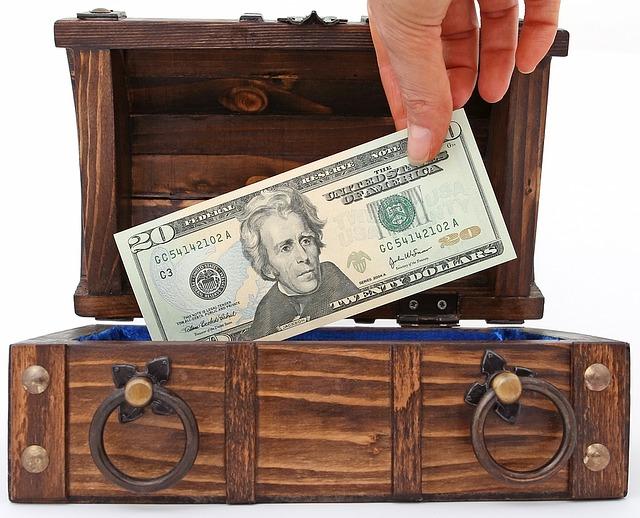
Every year, thousands of travellers report having had valuables stolen from their rooms. All of this anecdotal evidence suggests that room theft is one of the most common ways that travellers are separated from their precious valuables.
It doesn't matter whether you stay at a $5 per night hostel or a $100 per night upscale hotel; you are at risk if you don't take extra precautions to protect your valuables. Check out the following tips to see what you can do to outsmart the thieves.
#1 - Use The Provided Lockers In Hostels
.jpg)
A proper hostel should always provide lockers for travellers to store their valuables inside. Most of them do nowadays but if you find one that doesn’t, it’s better to stay somewhere else.
Any valuables or cash that you don’t want to keep on your person should be kept in one of the provided lockers when you leave the hostel, when you go to the bathroom, when you go to another room and also while you sleep at night (the main times people get an opportunity to steal your valuables).
There are different types of lockers found in hostels. There's the type with an in-built lock where you pay a small deposit for the key and you can then use it immediately. The other common type of locker found in hostels is the one that can only be locked with a separate padlock.
Unfortunately, many dormitories won't or can't provide you with a padlock for the provided lockers and that’s one reason why it’s very important to carry your own. Choosing a padlock can be confusing though, so we've written a detailed guide on how to choose the right padlock for travel.
While not infallible to that rare breed of professional thief, a quality padlock will help to deter opportunistic thieves, who will be looking for an easy opportunity to steal.
Consider also the location of the locker units within the building before committing to staying at the hostel. It’s better if the lockers are in a high-traffic, well-lit, well-monitored area of the hostel. Lockers that are hidden away in some dark, quiet corner of the building are not as safe for obvious reasons.
#2 - Hide Your Locker Key When Sleeping At Night (In Hostel Dormitories)
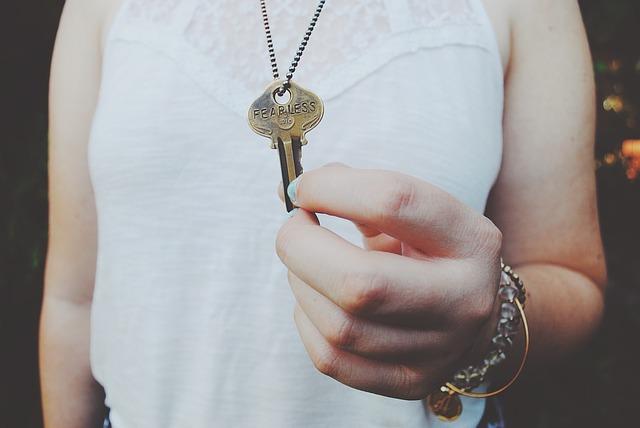
So you might have your valuables and cash all locked up inside one of the provided lockers while you sleep at night but what if somebody gets a hold of the key? That’s why it’s a good idea to find a secure place for your locker or padlock key while you sleep at night.
There are many options for ensuring your padlock key won’t fall into the wrong hands while you sleep. Perhaps the best thing is to attach a strong loop of cord to the key and wear it around your neck or wrist.
If your underwear has zip pockets, you could also zip it up in there. You could also bury it among some dirty laundry within your bag or keep it inside your pillowcase as you sleep. Be creative in finding a good hiding place for the key.
#3 - Don't Leave Your Devices Unattended While They're Charging
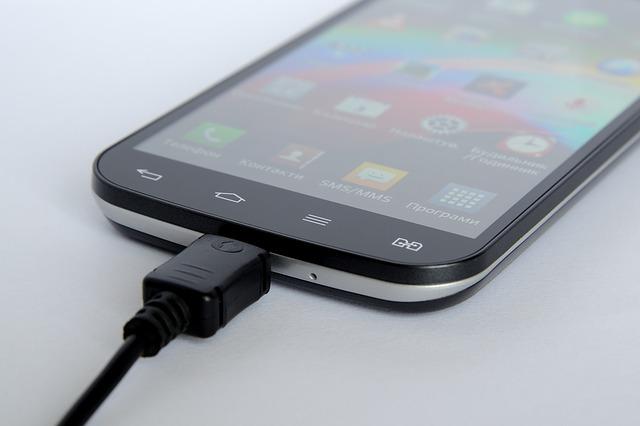
When you’re staying in a hostel dormitory, you need to be careful whenever you’re charging your electronic devices like your phone, tablet or laptop.
Unfortunately, you won’t always have a power outlet right beside your bed in a hostel dormitory and so you'll often have to leave your devices somewhat unattended in a far away corner of the room if you want to charge them.
You might plug the devices into the power outlet and leave them there to charge while you leave the room for a while or get a bit distracted reading a book or listening to music back at your bed. This is when thieves get their chance to swoop in.
Always therefore keep at least part of your attention on your devices when they’re charging on the other side of the room. You never know who might seize the opportunity to steal your phone (or worse) while you’re temporarily distracted.
#4 - Replace The Provided Padlock With Your Own
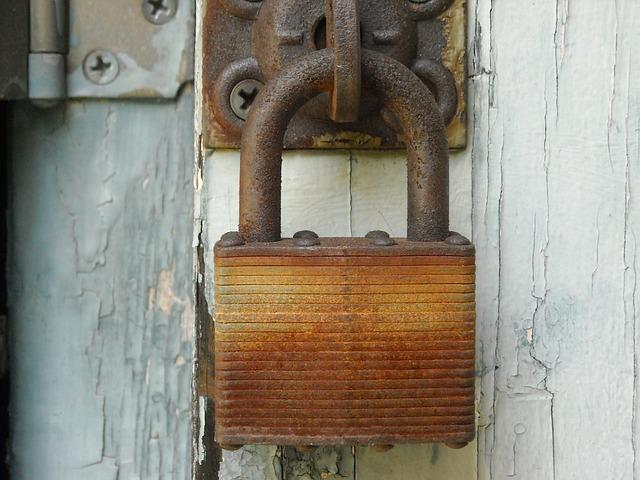
This tip applies to private rooms that require a padlock to secure the door from the outside. You’ll find a lot of establishments that use this system in India and many other developing countries.
Most of the time, when this is the locking system, you’ll be provided with a padlock after you check into the room. You should immediately replace this with your own personal padlock.
After all, who knows how many unscrupulous staff members have access to a spare key for that padlock? How difficult is it for an outsider to grab a hold of one of the spare keys that often dangle from a hook just behind the frequently unattended front desk? And how reliable is that rusty old padlock they gave you anyway?
Also, beware of the fact that regularly returning guests may have previously copied the key to that same padlock the hotel provided you with and may therefore have access to your room if they're staying in the hotel at the same time as you.
#5 - Always Reset Locks When You Lose The Key
If you ever lose a key to your padlock while travelling, you always should buy an entirely new lock, even if you have a spare key to the lock. Somebody could easily have found or possibly stolen the key that you think you've lost and will have access to your room unless you change the lock fast.
Likewise, if you're staying at a nice hotel that uses keycard door locks and you lose your keycard, you should never have a duplicate card issued. The lock should be reset with a brand new code and the old keycard should rendered invalid by the hotel.
#6 - Make Your Room Seem Like It's Always Occupied (Even When It's Not)
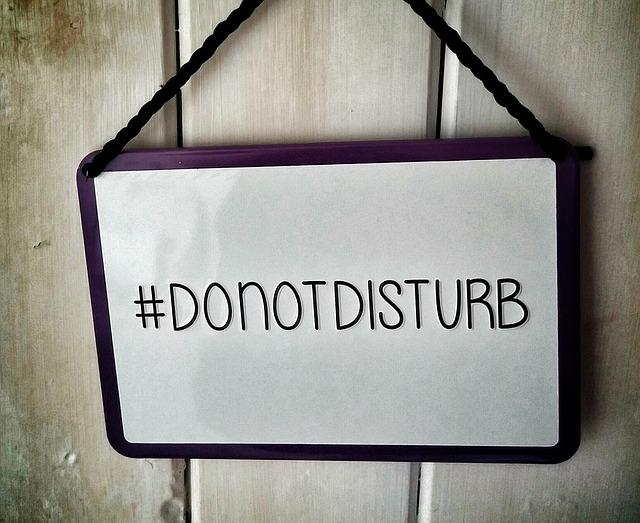
The vast majority of burglaries that occur during the daylight hours happen when the property is vacant or perceived to be vacant. Likewise, your room is a far more attractive target to a would-be thief if it’s vacant and if the thief thinks they can be sure of that fact.
Obviously, you can’t stay in the room the entire day and hug your valuables close to your chest. You’re travelling, after all. So how can you play a little trick on would-be thieves and make them think your room is occupied (even while you’re away chasing waterfalls)?
Here are some ideas that you can try implementing:
- Leave the T.V, Radio or fan turned on during your absence, with the noise audible from outside the room
- Leave lights turned on if the room has windows, especially if leaving the room after dark
- Keep blinds or curtains pulled over the windows when you leave the room (especially if you’re on the ground floor); this will make it difficult for a burglar to peep in and figure out that the room is vacant
- Leave a ‘do not disturb’ sign hanging on the outside of the door, to help keep the cleaning maids out of your room while you’re away. This helps prevent theft not only from cleaning maids but also from fellow guests pretending to be staying in your room and just returning to grab something they forgot while the maid is busy cleaning the room.
#7 - Keep A Low Profile

Very few room break-ins are committed by random outsiders. The culprit is usually going to be an employee or a fellow guest. Many would-be thieves gather information about you over a period of time until they’re finally ready to strike.
You can make yourself less of a target by keeping a low profile during your stay and by making it difficult for fellow guests and hotel staff to gather information about you.
Don’t reveal your room number to anybody or that you’re alone in the room. Don’t openly talk about or reveal your expensive camera, laptop or other travel gadgets to fellow guests that you meet. Don’t tell other people too much about your schedule either; your plans for the day and when you expect to return.
If you’re staying at the same lodging for a number of days, try not to get into a predictable routine. It’s the 9-5 working routine that makes houses so easy to burgle during the daylight hours; thieves know the exact times that the property will be vacant.
Change things up frequently, so that a would-be thief that might have been observing you never feels confident that he has the perfect window of opportunity to strike.
#8 - Hide Your Valuables Inside The Room

A locked door to your room is only one layer of security and if that fails then what? Remember, the more layers of security you have, the more secure your valuables will be. When maintenance staff or employees have access to your room, it’s important to add another layer to be on the safe side.
Sometimes the best ways to throw a thief off the scent are the simplest – hide your valuables in a creative hiding place or even simpler, hide them inside low value, everyday objects that thieves will ignore.
Every room has at least a few decent hiding places for your valuables, especially for smaller items like cash, cards, jewellery and phones. Look around and be creative. Hide the valuables in places where a cleaning maid would be unlikely to accidentally discover them and in places no thief would ever think of searching.
Here are some suggestions for potential hiding places within your room:
- Above loose or removable ceiling panels
- Inside air vents
- Sealed inside an envelope and taped to the underside of a desk, table or bed
- In the narrow space behind a wall mirror
- On the top surface of a tall wardrobe
- Inside secret pockets in clothing, towels and luggage.
- Under the bed mattress
- Anywhere else you spot an opportunity!
Another thing you can do is to hide your valuables inside common, everyday objects. These objects are known as diversion safes as they divert the thief’s attention away from the true location of the item. When using a diversion safe, your valuables could be hiding right under a thief’s nose and they’d never realize!
Here are some ideas for diversion safes to get your creative juices flowing:
- Hide your laptop inside a large padded envelope, a technique known as the laptop parcel disguise
- Stash smaller valuables inside an empty shampoo bottle, water bottle safe or a hairbrush safe.
- Stash a rolled up emergency $100 or other bill inside an empty chapstick tube
- Hide smaller valuables like cards, cash and phones inside a hollowed out paperback book or inside a specially made book diversion safe.
#9 - Lock Your Valuables Away
If you can't find any good hiding places for your valuables or you just doubt the efficacy of your hiding places, consider locking them away somewhere, either inside the room or outside it. This is another way to add an extra layer of security to your valuables.
Given that you're not staying at a hostel that provides lockers, there are four main ways to lock up your valuables at your lodging:
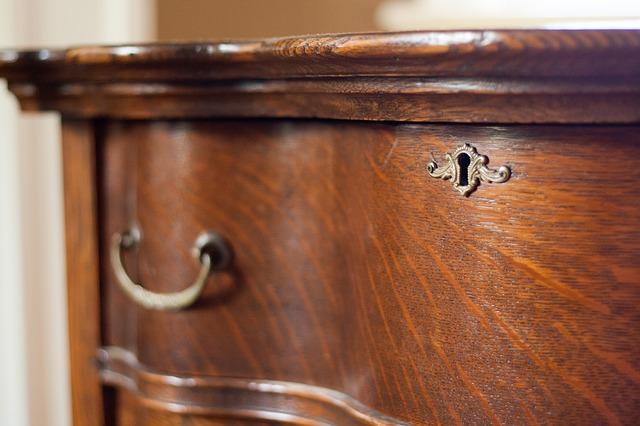
Using the existing furniture inside the room
One way to add another layer of protection to your valuables is to lock them away inside a drawer, cupboard or wardrobe that’s already inside the room. Of course, not every room will provide such an opportunity but if a room does, you should use it.
If the drawer, cupboard or wardrobe doesn’t come with its own key, you can try to lock it with your own padlock and failing that, you can try a padlock & chain or padlock & cable system to secure two of the doors or handles together.
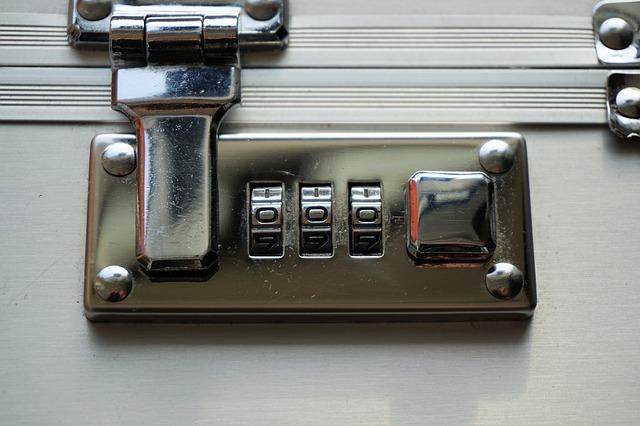
Inside Your Luggage
If you travel with a lockable briefcase, you'll already have a way to lock your valuables away.
If you travel with a backpack that has padlockable zippers or even a lockable drawstring mechanism, you can lock your valuables away inside that whenever you leave the room.
For a luggage lock, It’s better to use a key-opening padlock, as most of those cheap, multi-dial combination locks are too easy to crack.
Of course, even with your valuables padlocked away inside your bag, a thief can still easily just steal the entire bag, cut the bag open with a sharp blade or even just take a ballpoint pen and push it through the zipper to get full access to the goodies inside.
For this reason, if you're implementing this tacticyour backpack should ideally have anti-theft features, such as a slash-resistant fabric, puncture-resistant zippers and an integrated steel cable for securing it to a strong fixture in the room.
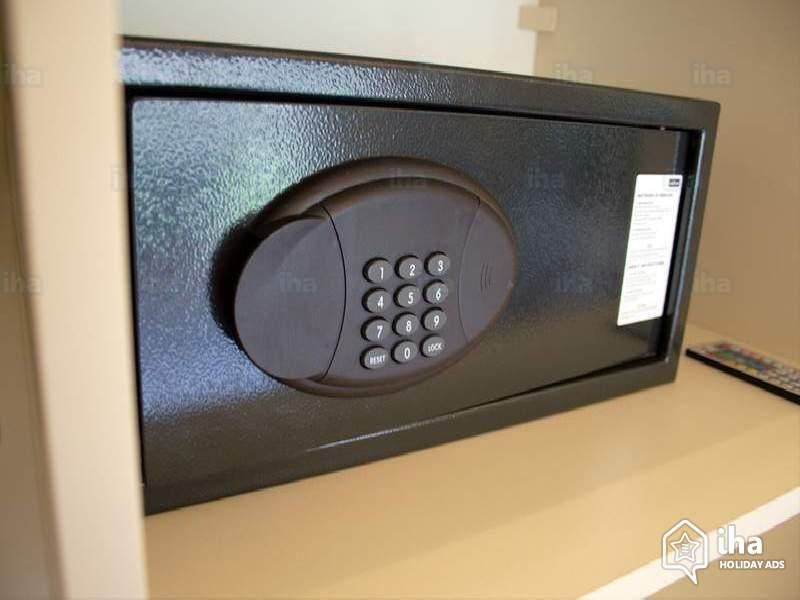
Inside a hotel safe
There are two main types of hotel safes you’ll come across; the hotel in-room safes and the hotel safes behind or near the front desk.
The in-room safes, while more convenient, are the less secure of the two and they usually have less liability protection too, so it’s better to use the ones at the front desk.
A word of warning with hotel safes – Since guests sometimes forget their safe code and the safe can also malfunction electronically from time to time, the hotel does have a backup way to open the safe, either via a special reset code (usually a string of zeros like 00000), master override key or special electronic device.
In other words, you are not the only person with access to your hotel safe. Also, rather alarmingly, the locks found in many hotel safes can be easily picked with just a paperclip.
Luckily, you can provide an extra layer of security to your hotel safe with a hotel safe lock, so that even unscrupulous hotel employees in possession of override keys or reset codes can't gain access.
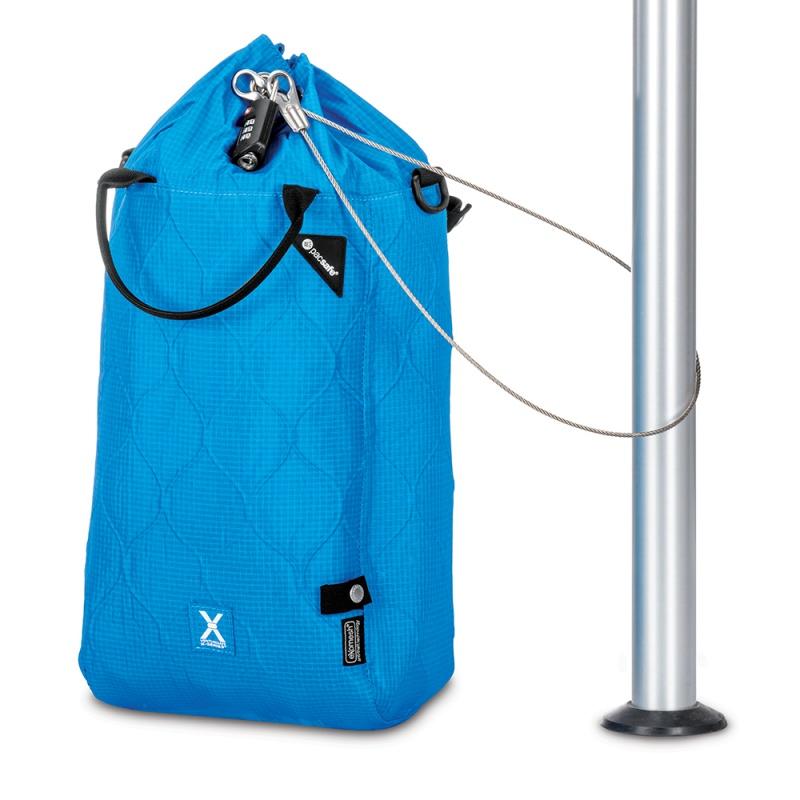
Inside a portable safe
Since it’s only really the more expensive hotels that provide in-room safes for their guests, many travellers that prefer budget accommodation options are opting to carry their own ‘portable safes’.
A portable safe is basically a sealable pouch made from a very strong, slash-proof fabric, which can be tethered to a fixed immovable object in the room via a heavy-duty, stainless steel cable. It’s small enough and lightweight enough to be highly portable, yet robust enough to deter opportunist thieves.
You need not worry about finding something to attach the safe to; there are usually several possible anchor points in most rooms; a water pipe, a radiator, a bed frame, an armchair, a curtain railing, a towel rack etc. Just imagine a thief trying to escape down the corridor dragging the huge armchair that your portable safe is still attached to.
While a portable safe probably won’t stop a professional thief armed with bolt cutters or a battery-powered dremel tool, it’s perfect for protecting you from the most common type of theft that occurs to travellers; opportunistic theft by maintenance staff or fellow guests while you’re absent from the room.
Note: If you don't want the hassle of locking all your valuables away somewhere every time you leave the room, there are some valuables which can be just tied down or tethered to a fixture in the room. For example, you can tether your laptop to something in the room using a specially designed laptop lock and steel security cable.
#10 - Use Tamper Evident Tape

One way that theft from your room can happen is in small, subtle increments. For example, every day, just a few dollars might go missing from your stash of cash.
A thieving maid might play this strategy in the hope that you’ll never realize that anything has gone missing. After all, if it’s only a few dollars less than you thought you had, then maybe you counted it wrongly the first time?
This strategy can prove to be deadly effective because you don’t finally realize you’ve been a victim of a habitual thief until it’s too late and a large amount of money has been stolen.
Another reason that some people don’t immediately realize they’ve been robbed is because they keep the room in an untidy condition. If you can’t locate something that’s been stolen, it’s easy to say ‘oh I’m sure it’ll turn up when I finally get this room tidied.'
Confident in the knowledge that the item is just hiding somewhere among the chaos, you delay tidying the room until the following evening, giving the thief a chance to strike again. If you had realized after the first robbery, you could have taken measures to prevent the second.
Even if nothing has physically gone missing from your room and nothing is amiss, you could still be a victim of data theft; a thief may have found your credit or debit card and noted down the number, before leaving the room just as it was when you left it.
So what’s the solution? How can you know immediately if a theft has occurred, even if it’s a very subtle theft? Well, one possible solution is to carry tamper evident tape.
You can put it over zippers, luggage locks, sealed envelopes etc. If somebody removes the tape and tries to reapply it, a distinct void pattern shows through the tape, telling you that someone has been snooping around.
#11 - Install Electronic Deterrents
If you don’t travel with a dog, you’re going to have to rely on electronic deterrents for scaring away intruders whether it's while you're out of the room during the day or asleep inside it at night. Luckily, many of these devices are lightweight, compact and inexpensive, designed specifically for travel.
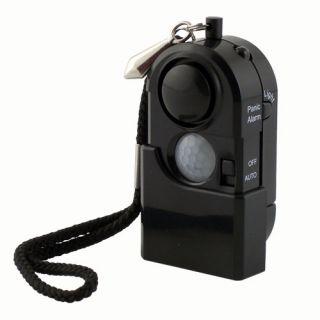
Motion detection alarms – These can be placed over the door or even over an open window to sound a piercing alarm whenever an intruder enters.
They work by sending out an infrared beam, which triggers the alarm when tripped.
Make sure you buy one with decent range (at least 7 feet) and if you’re planning to use it when you’re out of the room, make sure it has the ability to re-arm itself automatically after being tripped the first time.
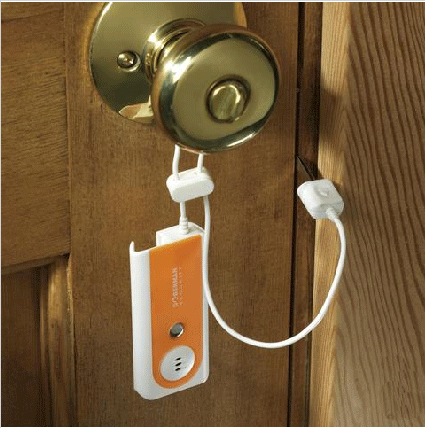
Portable Door Alarms - There are a few different variations but the most common design just hangs on the doorknob and uses two thin prongs that fit into the gap between the door and the doorjamb.
When the door is opened, the prongs come apart and trigger the alarm to sound. The popularity of this design owes itself to its universal applicability as it can be used with any door type.
#12 - Keep Out Intruders While You Sleep At Night

If you’ve ever felt paranoid or vulnerable while alone in your room when travelling, especially at night or while showering in the bathroom, you’re not alone. That feeling of insecurity is somewhat justified for a few reasons:
- Other than when the room is vacant, the second most popular time for thieves to strike is during the night while you’re asleep and the third most popular time is while you're taking a shower in the bathroom
- Very few room doors have a fitting to allow you to padlock them from the inside, even if they have a fitting on the outside
- Many rooms don’t even have additional deadbolts on the inner side of the door. Often, your last line of defense is against break-ins is the easily bypassed push-button doorknob lock, for which the staff seem to always have a spare key.
- Many rooms have unprotected single-pane windows without burglar bars or wooden shutters and what if the room gets stuffy and you need to leave windows open for ventilation at night?
Apart from the obvious solution of blocking the doors and windows with heavy furniture found inside the room, there some really portable gadgets that you can travel with that will help make your room a lot more secure and help you to sleep more soundly at night.
Bear in mind that all of these gadgets will only work if the door to your room opens inwards. If the door opens outwards into the corridor, most of them will not work.
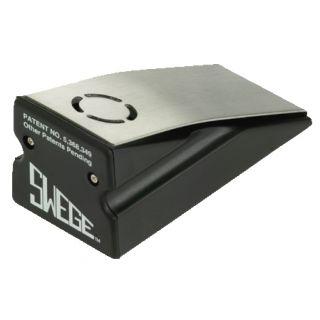
Portable door wedge - These are one of the simplest, most portable, yet most effective solutions for keeping out unwanted intruders.
Usually made from rubber, you just place the thin end of the wedge underneath the door and kick it into place.
They work best on hard surfaces like tiles or wood but extra features like Velcro stripson the underside restore their functionality on slippery surfaces such as carpet. Some door wedges also incorporate an alarm that will alert you when the wedge is disturbed.
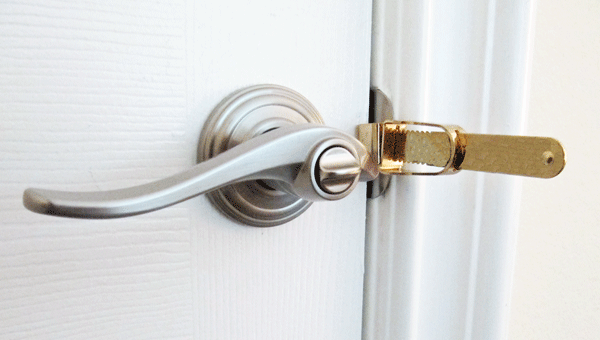
Portable Door Lock - There are many types of portable door locks but they all basically do the same thing - prevent the door from opening inwards in case somebody bypasses the ordinary locking mechanism.
In the most common design, one end of the device inserts into the cavity where the existing latch of the door goes, while the other end protrudes on the inner side of the door and has a catch that physically blocks the door from opening.
Even if somebody has a spare key or manages to pick the lock, the door cannot be opened without applying extreme force.
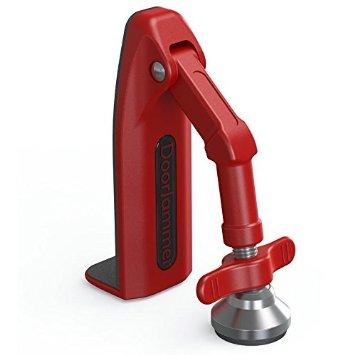
Portable Door Jammer - These use a slightly different principle to portable door locks – they convert the horizontal force exerted by somebody trying to enter into a downward vertical force that just goes into the floor, securing the lock even tighter.
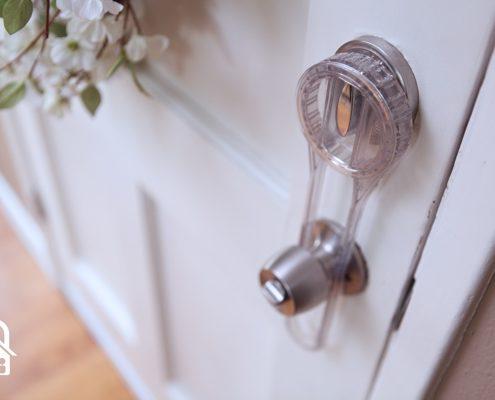
The Lock Locker - Even locks need locks. This is another very portable little gadget, which is designed specifically for doors with deadlocks. It’s designed to stop an intruder from opening the deadlock from the outside, even if they have the correct key.
The device goes on the inner side of the door and consists of two pieces at either end, linked by a long flat section. One end fits over the handle and the other fits over the deadbolt latch. Once set up, the deadbolt can’t be turned unless the device is removed from the door.
#13 - Take Your Valuables With You

If you just can’t find a viable means for securing your valuables at your lodging, you may have no choice but to simply carry all your valuables with you whenever you leave the room.
This of course carries its own set of risks so only do this if you’re confident that you can keep your valuables closely attended to during your daily activities.
If you’re going to be swimming alone at the beach or staying out late on a drunken pub crawl, it might be better to just leave your stuff in the room.
Another question to ask yourself is if your bag is well protected against pickpockets, bag-snatchers and bag-slashers? If you're just carrying a standard backpack then the answer to that question is no.
If you travel with an anti-theft backpack, then you're certainly better prepared against street thieves, but you could still of course be mugged, especially in cities where violent crime is prevalent.
What if something still gets stolen?
It's just a fact of life that even if you were to implement all of the tips in this article, you still could be a victim of room theft. After all, shit just happens sometimes despite our best efforts to prevent it.
The first thing you can try doing is filing a report and give it to the hotel, which may contact the police. If you were staying in a room with a keycard lock, it may be possible to take a reading of the lock and find out when the room was entered and possibly other information.
In the case that you are unsuccessful in tracking down the thief, your best recourse is probably travel insurance, since most hotels and guesthouses generally only have limited liability in the event of room theft.
Final thoughts
It's a sad fact that most people have to be so paranoid about having their valuables stolen during what's supposed to be a relaxing trip abroad, but if people ignore the issue of room security altogether, they'll have much bigger problems on their plate to deal with sooner or later.
We hope the tips and information shared in this article has been useful to you and has made you more aware of what it takes to really secure your valuables against theft.
If you liked this article or found it useful, please share it with other travellers. Have you ever been a victim of room theft? If so, we'd love to hear your story! What other tips do you have for keeping burglars out of a hotel room? Do leave us a comment below and we'll reply to you as soon as possible.
JOIN OUR LIST
SUPPORT US
FOLLOW US
ABOUT US
Our names are Eoghan and Jili and we hail from Ireland and India respectively.
We are two ardent shoestring budget adventure travellers and have been travelling throughout Asia continuously for the past few years.
Having accrued such a wealth of stories and knowledge from our extraordinary and transformative journey, our mission is now to share everything we've experienced and all of the lessons we've learned with our readers.
Do make sure to subscribe above in order to receive our free e-mail updates and exclusive travel tips & hints. If you would like to learn more about our story, philosophy and mission, please visit our about page.
Never stop travelling!
FOLLOW US ON FACEBOOK
FOLLOW US ON PINTEREST
-lw-scaled.png.png)

